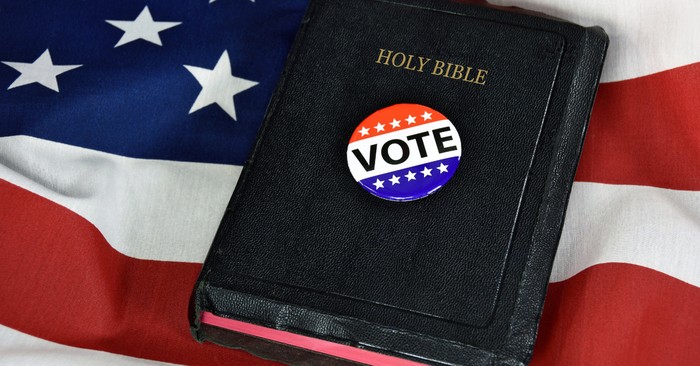How to Vote Biblically As a Christ-Follower
- Dr. James Emery White Mecklenburg Community Church
- Updated Nov 05, 2024

Politics matter, and if you are a Christian you should be politically active. The reason is because culture matters. The world matters. We are citizens in this world, and the Bible says that as citizens we have a duty to the world in which we live. There is a responsibility as a Christian to vote Biblically.
Jesus couldn’t have made this clearer than in His famed Sermon on the Mount when He called us to be salt and light (Matthew 5:13-16).
Those were important metaphors.
In Jesus’ day, salt was one of the most useful and important elements you could possess, but it wasn’t because of what it did for the taste or the seasoning of food. The main use for salt was as a preservative. If you had a fish or a piece of meat that you couldn’t eat right away, you would take some salt and rub it in. The salt would keep the meat from decaying. So when Jesus said that we should live a life that is like salt to the earth, He meant that we should live life in such a way that our very presence in the world acts like salt on the world.
Then Jesus called us to be the light of the world. Letting our light shine is having what Christ is doing in our life, and the truth about what Christ wants to do in everyone’s life, be known. The light is the message of Christ.
So you can think of it this way: salt is a negative influence—meaning, that it works against something. Light is a positive influence—it’s trying to bring something.
We work against moral and cultural decay.
We work for truth.
This means being a passive observer of culture is not an option. As John Stott once noted: “One can hardly blame unsalted meat for going bad. It cannot do anything else. The real question to ask is: ‘Where is the salt?’”
This obviously includes involvement in politics.
I get asked from time to time whether a Christian should even bother with politics or bother to vote. They might say: “Well, what difference is it going to make? God is going to do what God is going to do.” This is a terribly passive approach to civic engagement and a deeply flawed fatalism that you won’t find supported in the Bible.
Let me put this as clearly as I know how: For a Christian, it is unconscionable not to be engaged in politics. Christians can and should pursue vocations in politics, work for legislation, and most certainly vote. To fail to do so is abdicating our role as salt and light.
But how should a Christian be political?
There are three dynamics to keep in mind when voting Biblically (And here, I am writing with my American audience in mind, but it’s easily transferable.):
1. When it comes to politics, you are first and foremost a Christ-follower.
If you are a Christ-follower, you are not primarily a Republican or a Democrat. Not first and foremost. You are a Christ-follower first and a Republican or Democrat second—a distant second.
For some of you, this is a relief because you’ve been feeling politically homeless during this season. You don’t identify with either party. This may explain why many of you have felt so politically torn. Maybe you’re theologically conservative but socially compassionate. Maybe you feel too conservative for the progressives but too progressive for the conservatives. Maybe you care about the sanctity of life but you’re also concerned about global warming.
It’s easy to feel torn as a Christ-follower. In fact, you should feel torn.
Because your allegiance is to Jesus, not a platform. Your ultimate citizenship is not to America, much less to an American party. Your ultimate citizenship is in heaven. And as a follower of Jesus, you’re going to find that on some issues one party has it right and on other issues, the other party has it right. On a third issue, both parties may have it wrong.
And by right or wrong, I mean looking at whether they hold to a biblical position. As Christians, we may align with a party, but as Christ-followers, we never stand under that party. We always stand over it, taking stands for Jesus wherever those stands may lead us. We are never to turn a blind eye or a deaf ear to what Jesus would clearly want us to see and hear just because it goes against our political party.
As Martin Luther King once said, “We are not the master of the state, or the servant of the state, but the conscience of the state.”
2. You are always voting for the lesser of two evils.
So how do you vote as a Christian when it doesn’t fall into neat political divides or you are not thrilled with either candidate? If there is a phrase I’ve heard repeatedly of late, it’s that people feel they are having to “choose between the lesser of two evils.” This is how I think many Americans have felt for any number of recent elections on both the state and national levels.
And there’s a reason.
There is no such thing as a perfect candidate. And those who say that when it comes to choosing the lesser of two evils you can’t ever choose evil so you shouldn’t vote for either, are – I believe – misguided.
Unless Jesus is on the ballot, you’re voting for the lesser of two evils no matter who is running, and you’re doing that every single election. That doesn’t mean you overlook character; it just means that all candidates are going to be deeply flawed.
So you still must choose and vote.
I will venture to offer than when you make your choice, it’s not about whether they are a devoted Christ-follower. It would be nice if more candidates were, but what’s critical is where they stand on issues of importance to Christ and culture. People sometimes forget that when it comes to electing a representative – a senator, a governor, or a president – we’re not electing a resident pastor.
3. The key to Christian political engagement is a Christian mind wielding a biblical worldview.
So what’s key to voting? What’s the key to political engagement?
To think and to vote as a Christian.
But that’s exactly what so many of us do not do.
What we tend to do is compartmentalize our thinking. A compartmentalized mind is one that separates life into distinct categories, such as faith, work, family, Facebook, the stock market—all without integration. Our thinking about one area never informs our thinking about another. So you can be a Christian but not reflect about an issue in light of your faith.
What does it mean to think about the sanctity of human life and its ending biblically?
What does it mean to think about immigration biblically?
What does it mean to think about issues surrounding gay marriage or gender identity biblically?
What does it mean to think about the poor biblically?
It’s stunning how few Christians even attempt to look at the issues through a biblical lens. They just swallow an entire platform, left or right, uncritically and with evangelistic zeal.
I remember reading a study that came out of LifeWay research last election cycle back in 2016. It found that only one in 10 Christians said the Bible shaped their political views. The vast majority said they were influenced by either friends or the media.
We must work toward having a Christian worldview. And “worldview” is a key word. Your worldview is the set of ideas by which you judge other ideas. It’s how you engage the vast range of human thought and creation from a Christian perspective.
Consider Martin Luther King, Jr. whose Christian worldview was everything in challenging racial discrimination and segregation. Reflect on his words, written from a Birmingham jail:
“... there are two types of law: just and unjust.... A just law is a manmade code that squares with the moral law or the law of God. An unjust law is a code that is out harmony with the moral law.... All segregation statutes are unjust.”
King laid claim to a law above man’s law. No other worldview would have given King the basis for such a claim. And from it, he was salt and light in a day and time that needed it.
So the question for the Christian is not whether they should be involved in politics, much less vote.
The key is how the Christian is to be involved. And the answer is clear:
… do it Christianly.
Sources
John R.W. Stott, The Message of the Sermon on the Mount: Christian Counter-Culture.
Bob Smietana, “Bible Influences Only 1 in 10 Evangelicals on Immigration Reform,” Christianity Today, March 11, 2015.
Martin Luther King, Jr., Why We Can’t Wait (Letter from a Birmingham Jail).
James Emery White is the founding and senior pastor of Mecklenburg Community Church in Charlotte, NC, and the ranked adjunct professor of theology and culture at Gordon-Conwell Theological Seminary, where he also served as their fourth president. His newest book, Christianity for People Who Aren’t Christians: Uncommon Answers to Common Questions, is now available on Amazon or at your favorite bookseller. To enjoy a free subscription to the Church & Culture blog, visit ChurchAndCulture.org, where you can view past blogs in our archive and read the latest church and culture news from around the world. Follow Dr. White on Twitter, Facebook and Instagram @JamesEmeryWhite.
The views expressed in this commentary do not necessarily reflect those of CrosswalkHeadlines.
James Emery White is the founding and senior pastor of Mecklenburg Community Church in Charlotte, NC, and a former professor of theology and culture at Gordon-Conwell Theological Seminary, where he also served as their fourth president. His latest book, Hybrid Church: Rethinking the Church for a Post-Christian Digital Age, is now available on Amazon or from your favorite bookseller. To enjoy a free subscription to the Church & Culture blog, visit churchandculture.org where you can view past blogs in our archive, read the latest church and culture news from around the world, and listen to the Church & Culture Podcast. Follow Dr. White on X, Facebook and Instagram at @JamesEmeryWhite.

.jpg)




















